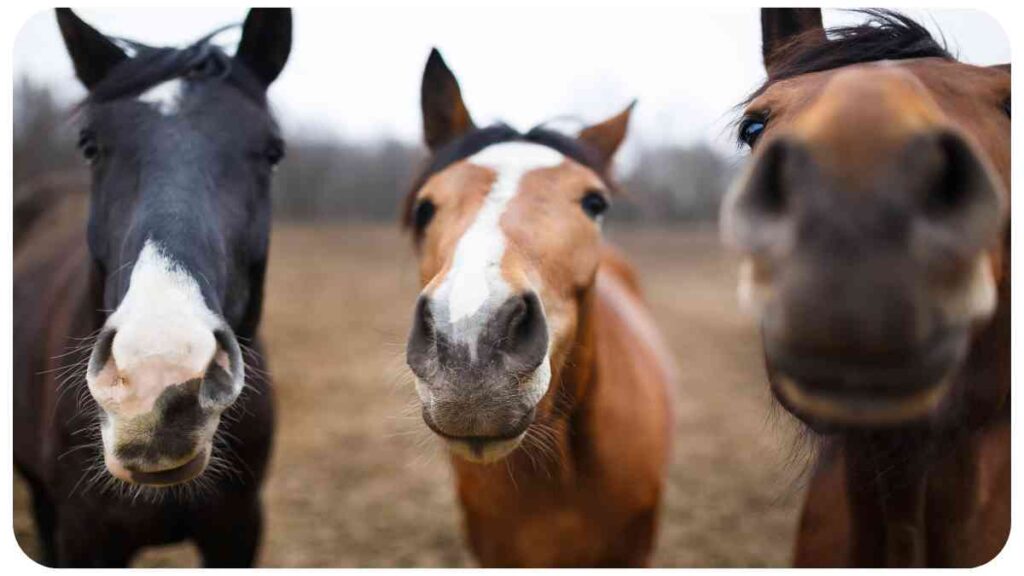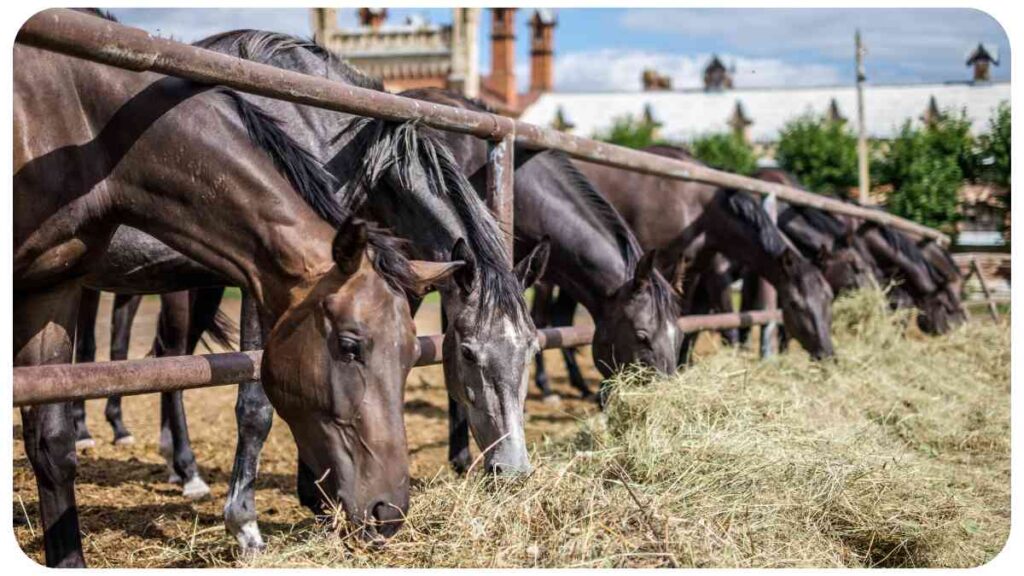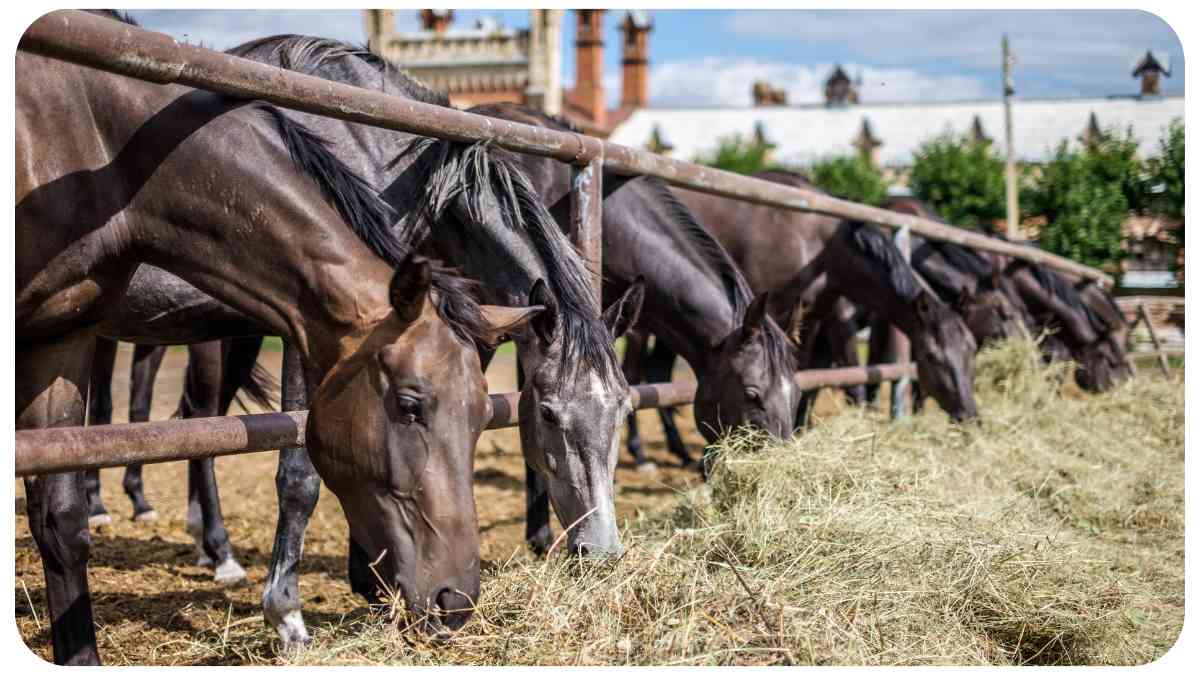Welcome to our comprehensive guide on horse allergies! If you’re a horse owner or someone who works closely with horses, then understanding and managing allergies is crucial for the well-being of these magnificent animals.
In this article, we will dive deeper into what horse allergies mean, how they can affect horses, and most importantly, how to effectively manage them. So, saddle up and let’s get started!
| Key Points |
| Horse allergies are immune system overreactions to certain substances. |
| Common allergens for horses include dust mites, pollen, mold spores, and insect bites. |
| Recognizing the signs and symptoms of horse allergies is crucial for prompt diagnosis and treatment. |
| Proper diagnosis by a veterinarian is essential for effective allergy management. |
| Environmental management, dietary modifications, medications, and natural remedies can help manage horse allergies. |
| Collaborating with equine specialists and professionals is important for comprehensive allergy care. |
| Preventive measures, such as maintaining a clean living environment and monitoring allergen exposure, can reduce the risk of allergic reactions. |
| Stay informed about the latest research and advancements in horse allergies for improved management techniques. |
Understanding Horse Allergies
What Are Horse Allergies?
Just like humans, horses can also develop allergies. Allergies occur when a horse’s immune system overreacts to certain substances. These substances, also known as allergens, can vary from environmental factors to specific foods or even medications. When a horse comes into contact with an allergen, their immune system triggers an excessive response, leading to allergy symptoms.
When managing horse allergies, wearing properly fitting horseback riding boots is essential. Ill-fitting boots can cause discomfort and worsen allergies, so it’s crucial to choose the right size and ensure a comfortable fit for your horse
Common Allergens for Horses
Horses can be allergic to a wide range of substances. Some common allergens include:
| Allergen | Description |
| Dust mites | Small insects that can be found in bedding |
| Pollen | Fine powdery substance produced by plants |
| Mold spores | Microscopic fungi that grow in damp areas |
| Insect bites/stings | Allergic reactions to certain insects |
| Certain foods | Some horses may have dietary allergies |
It is important to be aware of these allergens and take appropriate steps to minimize exposure to them.
Signs and Symptoms of Horse Allergies
Spotting the signs of horse allergies early on can make a significant difference in managing the condition effectively. Here are some common signs and symptoms that your horse may exhibit if they have allergies:
- Excessive itching and scratching
- Hives or skin rashes
- Hair loss or unevenly distributed hair
- Respiratory issues such as coughing or wheezing
- Watery eyes or nasal discharge
- Digestive disturbances like diarrhea or colic
If you observe any of these symptoms in your horse, it is essential to consult with a veterinarian for a proper diagnosis.
Diagnosing Horse Allergies

Diagnosing horse allergies can be complex, as the signs and symptoms are often similar to other equine health issues. However, there are various diagnostic techniques that can help identify the specific allergens affecting your horse. Some common methods include:
- Intradermal testing: This involves injecting small amounts of potential allergens under the horse’s skin and observing the reaction.
- Blood testing: Blood samples can be analyzed to detect specific antibodies related to allergies.
- Elimination diet: By removing certain foods from the horse’s diet, it’s possible to determine if the allergies are food-related.
In the quest to manage horse allergies, choosing the perfect saddle is of paramount importance. A well-fitted saddle can prevent discomfort and allergic reactions, ensuring a comfortable riding experience for both the horse and the rider.
The Importance of Proper Diagnosis
Obtaining an accurate diagnosis is essential in managing horse allergies effectively. Only with a precise understanding of the allergens involved can appropriate steps be taken to reduce exposure and alleviate symptoms. Working closely with a knowledgeable veterinarian or equine specialist is crucial to ensure your horse receives the best possible care.
Managing Horse Allergies
Environmental Management
One of the key aspects of managing horse allergies is controlling the horse’s environment. By minimizing exposure to allergens, you can significantly reduce the frequency and severity of allergic reactions. Here are some tips for effective environmental management:
- Keep the stables and barn area clean and well-ventilated.
- Choose bedding materials that are low in dust and allergens, such as straw or rubber mats.
- Regularly clean and dust the horse’s living space to reduce allergens.
- Avoid turning out the horse during times when pollen counts are high.
By implementing these practices, you can greatly improve your horse’s comfort and reduce the likelihood of allergic reactions.
Dietary Modifications

In some cases, allergies can be triggered by certain foods in a horse’s diet. Identifying and eliminating these allergenic foods can significantly improve the horse’s condition. An elimination diet or consultation with an equine nutritionist can help pinpoint the problematic foods. Here is a table showcasing common allergenic foods for horses:
| Allergenic Foods | Description |
| Alfalfa hay | Some horses may develop allergies to this type of hay |
| Soy | Soy-based feeds can cause allergic reactions |
| Wheat | Wheat products can trigger allergies in some horses |
| Corn | Certain horses may be sensitive to corn in their diet |
| Barley | Barley-based feeds may lead to allergic symptoms |
If you suspect that your horse has a dietary allergy, it is crucial to work with an equine nutritionist or veterinarian to create an appropriate diet plan that eliminates the allergenic foods while meeting the horse’s nutritional needs.
Taking care of your horse’s hooves is crucial for preventing allergies. Regular hoof care, including trimming and proper cleaning, helps maintain overall hoof health and reduces the risk of allergy-related complications.”
Medications for Allergy Control
In cases where environmental management and dietary modifications are not enough to control horse allergies, medications can provide relief.
Your veterinarian may prescribe antihistamines, corticosteroids, or other medications to alleviate symptoms and manage allergic reactions. However, it’s important to consult with a professional before administering any medications to your horse to ensure safety and effectiveness.
Natural Remedies for Horse Allergies
Alongside conventional treatments, some natural remedies may help alleviate horse allergy symptoms. It’s important to note that natural remedies should not replace veterinary care, but rather serve as complementary options.
Here are a few natural remedies that have shown promise in managing horse allergies:
- Apple cider vinegar: Adding a small amount of apple cider vinegar to your horse’s diet may help support their immune system and reduce allergy symptoms.
- Omega-3 fatty acids: Supplementing your horse’s diet with omega-3 fatty acids, such as flaxseed or fish oil, can have anti-inflammatory effects that may reduce allergic reactions.
- Herbal supplements: Certain herbs, like nettle and chamomile, have anti-inflammatory properties and may provide relief for horses with allergies.
Remember to consult with your veterinarian or equine specialist before introducing natural remedies to ensure they are safe and suitable for your horse.
Prevention and Future Outlook
Preventive Measures for Horse Allergies
Prevention plays a crucial role in managing and minimizing horse allergies. While it may not always be possible to eliminate all potential allergens, taking proactive measures can significantly reduce the likelihood and severity of allergic reactions. Here are some preventive steps you can take:
- Regularly clean and groom your horse to minimize contact with allergens on their skin and coat.
- Use hypoallergenic bedding materials to reduce the risk of dust mite allergies.
- Monitor pollen counts and adjust turnout schedules accordingly.
- Introduce new feeds or supplements gradually to observe any potential allergic reactions.
By being proactive and attentive to your horse’s environment and needs, you can create a safer and more comfortable space for them.
To effectively manage horse allergies, it is important to be aware of common horse illnesses and their prevention strategies. By understanding these illnesses, horse owners can take proactive measures to minimize allergic triggers and maintain their horse’s well-being.
Further Research and Advancements
The field of equine allergies is continuously advancing, and researchers are continually working to develop new techniques and treatments.
It is essential to stay informed about the latest research in horse allergies and consult with equine specialists or veterinarians who are up-to-date with current advancements. By staying informed and open to new possibilities, you can enhance the care and management of your horse’s allergies.
Collaborating with Equine Specialists and Professionals
Managing horse allergies effectively often requires collaboration with a team of professionals, including veterinarians, equine nutritionists, and equine allergy specialists.
These experts can provide valuable insights, guidance, and personalized advice tailored to your horse’s individual needs. Building a trusted network of specialists ensures that your horse receives the best possible care and increases the chances of successful allergy management.
Conclusion
In conclusion, horse allergies can significantly impact the well-being and comfort of our equine companions. By understanding the causes, signs, and management strategies for allergies, we can provide the necessary care to keep our horses healthy and happy.
Remember to consult with professionals for accurate diagnosis, effective management techniques, and potential treatment options. With proper environmental controls, dietary modifications, and the support of veterinary care, you can enhance your horse’s quality of life and minimize the impact of allergies.
Let’s continue to learn, adapt, and improve our understanding of horse allergies to ensure our beloved equines stay vibrant and allergy-free.
Understanding horse body language is invaluable when it comes to managing horse allergies. Through comprehending their non-verbal cues, one can identify allergic reactions or discomfort early on, allowing for timely intervention and effective allergy management
Further Reading
For more in-depth information about horse allergies, you may find the following resources helpful:
- NY Allergy & Sinus Centers – Horse Allergy: This comprehensive article provides insights into the causes, symptoms, and management of horse allergies, along with tips for prevention.
- Healthline – Horse Allergy: Healthline offers a detailed overview of horse allergies, including common symptoms, diagnosis methods, and treatment options.
- NCBI – Horse allergy: A new indoor allergen: This scientific study delves into the discovery and characterization of horse allergens in indoor environments, shedding light on the specific compounds that trigger allergic reactions.
FAQs
Here are answers to some frequently asked questions about horse allergies:
What are the common signs of a horse allergy?
Common signs of horse allergies in humans include itching, sneezing, watery eyes, and respiratory symptoms. It is crucial to consult with a healthcare professional for proper diagnosis and management.
Can horses develop allergies to certain foods?
Yes, some horses can develop allergies to certain foods such as alfalfa hay, soy, wheat, corn, and barley. An elimination diet or consultation with an equine nutritionist can help identify and eliminate allergenic foods from the horse’s diet.
How are horse allergies diagnosed?
Horse allergies can be diagnosed through intradermal testing, blood testing, or elimination diets. Working with a knowledgeable veterinarian or equine specialist is important to accurately identify the allergens affecting your horse.
How can I manage horse allergies effectively?
Effective management of horse allergies involves environmental controls such as clean and well-ventilated stables, hypoallergenic bedding, and minimizing exposure to allergens. Additionally, dietary modifications, medications, and natural remedies can be incorporated based on the guidance of professionals.
Is there ongoing research on horse allergies?
Yes, research on horse allergies continues to advance. Staying informed about the latest developments in the field can help you access new treatment options and management strategies. Collaborating with equine specialists and professionals who are up-to-date with current research is invaluable in managing horse allergies effectively.

Hi there! My name is Hellen James, and I’m a horse riding expert. I’ve been riding horses since I was just a kid—and it’s been my passion ever since. But getting started with horse riding can be overwhelming. There’s so much to learn! If you’re looking for a way to get started and make sure you’re doing it right, I’m here to help.


